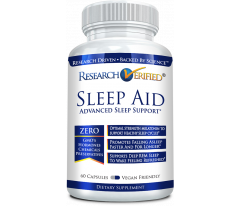Melatonin, often referred to as the “sleep hormone,” is produced naturally by our body’s pineal gland and plays a crucial role in regulating our sleep-wake cycle (1). Many people turn to melatonin supplements to aid sleep, particularly when dealing with jet lag or insomnia (2). But there’s a curious concern that has caught the attention of both users and researchers: Does melatonin cause nightmares? Let’s delve into the scientific evidence surrounding this claim, and possible ways to offset this effects.
Evidence: Melatonin and Nightmares
Before we dive in, it’s essential to understand the broader context. Melatonin’s influence on dreaming might be related to its impact on REM (rapid eye movement) sleep, a stage of sleep closely associated with vivid dreaming (3). By affecting the duration and onset of REM sleep, melatonin might indirectly influence dream content or clarity.
Some anecdotal accounts suggest that taking melatonin might be linked to vivid or disturbing dreams. Yet, when we delve into scientific research, the results are mixed.
In the systematic review of 37 randomized, placebo-controlled trials examining melatonin’s safety, nightmares were identified as a rare adverse event. Most adverse effects, including nightmares, either resolved on their own within days or stopped upon discontinuation of melatonin (4).
But, it’s not all straightforward. Some research suggests that melatonin, particularly in low doses, may even reduce the occurrence of nightmares, especially in conditions like PTSD (post-traumatic stress disorder). For example, a study from 2019 highlighted the potential benefits of melatonin in reducing nightmares among PTSD patients (5).
Ways to Offset Potential Nightmares
- Reduce the Dose: If you’re experiencing nightmares after taking melatonin, consider reducing your dose. A lower dose might still help you sleep without leading to vivid dreams. The recommended dose is generally between 1-10mg per day (6).
- Check for Additives: Ensure that your melatonin supplement doesn’t contain unnecessary additives or other ingredients that might be causing sleep disturbances.
- Incorporate Calming Herbs with Melatonin: Some individuals find that combining melatonin with calming herbs like chamomile, valerian root, or lemon balm can help enhance relaxation and potentially mitigate the chances of vivid dreams or nightmares (7).
Combining Melatonin with Calming Substances
As mentioned above, combining melatonin with other calming substances can influence its effects. Let’s explore some of these popular herbs and see how their benefits complement melatonin:
- Valerian Root: Valerian root is an herb that has been used for centuries to treat various ailments, including insomnia. Some studies suggest that valerian root can help reduce the time it takes to fall asleep and improve sleep quality (8). Combining melatonin with valerian root might enhance the sleep-promoting effects of both.
- Chamomile: Chamomile, often consumed as tea, contains antioxidants that promote sleepiness and reduce insomnia. It’s known for its calming effects and might help in decreasing the likelihood of nightmares or vivid dreams when taken with melatonin (9).
- Lemon Balm: Lemon balm, a herb from the mint family, has been used historically for its calming effects. Some research indicates that it can improve calmness and alertness during stress. Its soothing properties might complement melatonin’s effects (10).
Some sleep supplements intelligently blend natural ingredients with melatonin, offering a comprehensive, all-in-one solution. One notable example is Research Verified Sleep Aid, which delivers a safe daily dose of 6mg of melatonin, complemented by Chamomile, Lemon Balm, Valerian Root, and other ingredients, all geared towards fostering a calm and restful sleep.
Want To Learn More About Research Verified Sleep Aid?
Conclusion
Melatonin’s role in sleep is clear, but its connection to nightmares remains ambiguous. While some evidence points to vivid dreams as a potential side effect, others suggest its usefulness in reducing such occurrences. For those concerned, adjusting dosage, ensuring supplement purity, or complementing with calming herbs might help. As always, consulting with a professional and being attentive to one’s body is essential when using any supplement.




